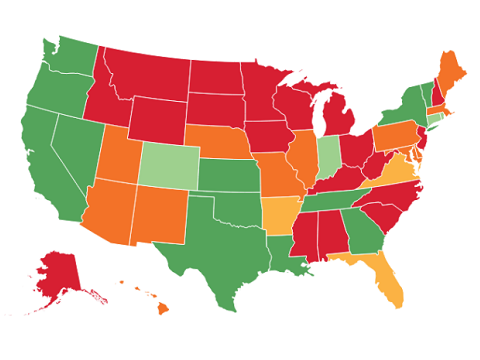This blog post provides information on states that have either enacted new anti-SLAPP laws or improved existing laws since the February 2022 publication of our Anti-SLAPP Report Card.
September 7, 2023: New Jersey Becomes 33rd State to Enact Anti-SLAPP Law
On September 7, 2023, New Jersey Governor Phil Murphy signed S2802, the Uniform Public Expression Protection Act into law, making the Garden State the 33rd state to enact an anti-SLAPP law. Including the District of Columbia, 34 jurisdictions now have anti-SLAPP protections codified into law, and nearly 80% of the U.S. population now lives in jurisdictions with anti-SLAPP laws.
Since S2802 was modeled after the Uniform Law Commission’s Uniform Public Expression Protection Act, New Jersey will join the top-ranked states under our methodology in the Anti-SLAPP Report Card.
With New Jersey’s action, a majority of the nation’s population now lives in jurisdictions with anti-SLAPP laws the Institute for Free Speech considers to be relatively strong, meaning laws that earn “B” grades or better.
While New Jersey’s new law does mostly adhere to the Uniform Law Commission’s model, at least one difference will prevent the state from earning a perfect score under our Report Card’s methodology. The law does not require courts to issue a stay of proceedings once an anti-SLAPP motion is filed. Instead, the statute states that “the court may order” such a stay. While the lack of a guaranteed stay is concerning for speakers faced with intimidating lawsuits, the law also states that “there shall be a presumption that such a stay shall be granted.” Hopefully, New Jersey courts will consistently honor the law’s “presumption.” Importantly, the law does, as recommended in the model law, instruct judges to “broadly” interpret and apply the statute’s protections for First Amendment rights.
In yet another testament to the bipartisan appeal of the Uniform Law Commission’s model anti-SLAPP legislation, S2802 passed unanimously in both the Assembly and Senate. Thanks to the New Jersey Legislature and Governor Murphy, New Jersey now has one of the strongest anti-SLAPP laws in the country.
May 8, 2023: Oregon Improves Already Strong Anti-SLAPP Law
Oregon’s strong anti-SLAPP law earned an “A-” grade in our 2022 Anti-SLAPP Report Card. Its principal previous defect was its lack of a provision explicitly guaranteeing a right to an immediate (interlocutory) appeal. Court decisions interpreted the law as containing such a provision, but on May 8, 2023 Governor Tina Kotek signed a bill into law that more clearly codifies this protection.
In addition to this clarification of the right to an immediate appeal, the new law also:
(a) Clarifies that the definition of the expressive speech and conduct protected by the law explicitly includes the rights of “assembly” and “association,” and the “freedom of the press” when the speech/conduct is “in connection with a public issue or an issue of public interest.”
(b) Ensures a plaintiff cannot avoid paying attorney fees and costs to the speaker defendant by voluntarily dismissing the litigation after an anti-SLAPP motion has been filed.
This new law ensures that Oregon’s law now closely tracks the Uniform Law Commission model Uniform Public Expression Protection Act.
Overall, the changes represent a notable upgrade to Oregon’s anti-SLAPP procedures. The state’s procedures subgrade will rise from a B- to an A. The state’s overall grade will likely improve from an A- to an A+ in our next report card.
The new Oregon law goes into effect January 1, 2024.
May 2, 2023: Connecticut Supreme Court Rules State’s Anti-SLAPP Law Includes a Right to an Interlocutory Appeal
In three separate decisions (Smith v. Supple, Pryor v. Brignole, Robinson v. V. D.) released on May 2, 2023, the Connecticut Supreme Court ruled that the state’s law affords defendants the right to an “immediate appeal” of a trial court’s denial of an anti-SLAPP motion.
The absence of an explicit, statutory right to such an appeal was the most significant flaw of Connecticut’s anti-SLAPP law. While the statute (§ 52-196a) references an “interlocutory appeal,” the text did not expressly provide defendants the right to an immediate appeal. Fortunately, the state’s highest court has now cleared up the confusion.
Case law and legislative history filled in the gaps for the court:
The purpose of the ‘‘extraordinary remedy’’ provided by the anti-SLAPP statute persuades us that its substantive benefit—a right to avoid costly and burdensome litigation on the merits—would be lost if defendants were required to litigate putative SLAPP cases to conclusion following the erroneous denial of a special motion to dismiss. The statute’s extensive legislative history indicates that the legislature was particularly concerned about defendants laboring under the burden of having to defend against SLAPP suits, which are by definition frivolous and oppressive, as a consequence of having exercised their first amendment rights. This renders the benefit conferred by the anti-SLAPP statute analogous to other statutory and common-law rights to avoid litigation on the merits—such as double jeopardy, collateral estoppel, res judicata, and absolute or sovereign immunity—which this court has deemed to qualify as final judgments under § 52-263 and Curcio because they cannot be vindicated by an appeal following the conclusion of trial before the trial court. (Smith v. Supple)
Highlighting an advantage of uniformity, the court stated in Pryor v. Brignole that it also examined “analogous laws of other states” to reach the conclusion “that § 52-196a affords defendants a substantive right” to an immediate appeal. Smith v. Supple notes that “the legislative history of our anti-SLAPP statute signifies that it was modeled after anti-SLAPP statutes that came before it in other states” and that “numerous other states have enacted legislation specifically providing for interlocutory appeals of denials of anti-SLAPP special motions to dismiss.”
Now that the Connecticut Supreme Court has ruled that the state’s own anti-SLAPP law also provides speakers with the right to an immediate appeal, Connecticut’s anti-SLAPP procedures subgrade will rise from a C+ to an A. The state’s overall grade is likely to improve from a B+ to an A-.
March 23, 2023: Utah Replaces Weak Law with Uniform Public Expression Protection Act
Utah’s previously enacted Citizenship Participation in Government Act earned a “D-“ in our Anti-SLAPP Report Card. In early 2023, the Utah State Legislature passed the Public Expression Protection Act (SB 18) with no opposition, and Governor Spencer Cox signed the bill into law on March 23.
Since, as described in the legislation, “[t]his bill enacts the Uniform Public Expression Protection Act,” and hews closely to the model, Utah now will join the handful of states with near-perfect scores under our methodology.
The new law not only expands the scope of the statute to cover any exercise of First Amendment rights on a matter of public concern, but also instructs courts to interpret the law broadly to protect such rights. The replaced law only applied to speech narrowly deemed to be an act of “participating in the process of government.”
Utah’s Public Expression Protection Act also improves procedural protections by including a mandatory fee-shifting provision so that prevailing defendants may recoup legal costs. Furthermore, the recently adopted statute places the burden of proof on the plaintiff to show that the lawsuit is legitimate.
Lawmakers in Utah have vastly upgraded their state’s protections for citizens exercising their right to speak and publish.
The new law applies to lawsuits filed on or after May 3, 2023.
June 17, 2022: Hawaii Adopts New and Improved Anti-SLAPP Statute
Governor David Ige signed the Hawaii Public Expression Protection Act (SB 3329) into law on June 17, 2022. The new law, which took effect immediately, replaces Hawaii’s previously enacted anti-SLAPP statute, the Citizen Participation in Government Act, which earned a “D” in our Anti-SLAPP Report Card.
As stated in the recently adopted legislation, “The purpose of this Act is to enact the Uniform Public Expression Protection Act.” Anti-SLAPP laws that mirror this model bill from the Uniform Law Commission earn a perfect score under the Report Card’s methodology, and the final version of SB 3329 doesn’t stray far from the model. We therefore expect Hawaii’s new law will earn a top grade for the state.
Like most “D”-level anti-SLAPP laws, Hawaii’s previous law covered an extremely limited range of speech, protecting only statements provided to a government body during a government proceeding. The Hawaii Public Expression Protection Act applies to any “exercise of the right of freedom of speech or of the press, the right to assemble or petition, or the right of association, guaranteed by the United States Constitution or the Hawaii State Constitution, on a matter of public concern.”
Showing, once again, the bipartisan appeal of robust anti-SLAPP laws modeled after the Uniform Public Expression Protection Act, Hawaii’s version of the bill passed the House and Senate without a single legislator voting against it.
May 27, 2022: Arizona Amends Anti-SLAPP Law
While Arizona has had an anti-SLAPP statute for years, the law was among the worst in the nation, earning a “D-“ in our Anti-SLAPP Report Card. House Bill 2722, signed by Governor Doug Ducey on May, 27, 2022, will slightly improve the state’s overall grade.
As the Anti-SLAPP Report Card notes, Arizona would have jumped to a laudable “B+” simply by expanding the scope of its statute to cover all constitutionally protected speech on matters of public concern. While HB 2722 does add language to this effect, it also has an odd provision not in any other anti-SLAPP statute, which will greatly limit speakers’ ability to make use of the new law. As a result, Arizona will fall well short of the “B+” grade it could have earned without the provision.
This odd provision states that a defendant filing an anti-SLAPP motion must show that the lawsuit “was substantially motivated by a desire to deter, retaliate against or prevent the lawful exercise of a constitutional right.” Plaintiffs suing speakers will not be required to respond to an anti-SLAPP motion until or unless the target of their lawsuit has established this “prima facie proof.”
Arizona also eliminated the previous law’s provision that required payment of attorney’s fees and costs to defendants who prevail on an anti-SLAPP motion, which is the most important procedural provision in an anti-SLAPP law. The new law only allows the court to consider granting such an award. A right to an interlocutory appeal is created, but that too is conditioned on the defendant establishing the “prima facie proof” discussed above. So that appeal right may not be worth much in practice.
Due to the importance of the expanded scope of covered speech, Arizona will shed its “D-“, the lowest possible grade for a state with an anti-SLAPP statute, but will not rise by much. The effectiveness of the revised law will likely hinge on how the courts interpret it.
April 20, 2022: Kentucky Enacts Strong Anti-SLAPP Law
House Bill 222, which Governor Andy Beshear signed into law on April 20, 2022, was modeled after the Uniform Law Commission’s Uniform Public Expression Protection Act (UPEPA). An initial review shows that the final version of the legislation retains the essential provisions of the UPEPA. We therefore expect Kentucky’s anti-SLAPP statute to receive a near-perfect score under our methodology. Most importantly, the recently enacted law covers all speech protected “by the United States Constitution or Kentucky Constitution, on a matter of public concern.”
In a testament to the UPEPA’s bipartisan support, the legislation passed 82-0 in the House of Representatives and 30-2 in the Senate. After receiving bipartisan approval in the overwhelmingly Republican-controlled Kentucky General Assembly, the bill was signed by Kentucky’s Democratic governor.
Kentucky will join 12 other states with grades of “A-” or higher in our Anti-SLAPP Report Card.














